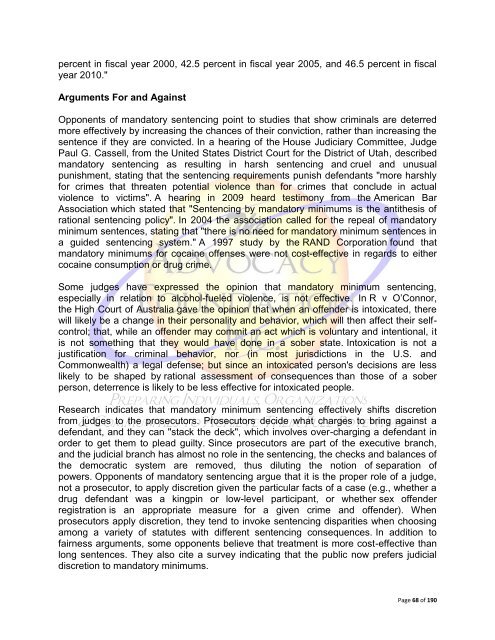The Violent Crime and Law Enforcement Act of 1994
The Violent Crime and Law Enforcement Act of 1994
The Violent Crime and Law Enforcement Act of 1994
You also want an ePaper? Increase the reach of your titles
YUMPU automatically turns print PDFs into web optimized ePapers that Google loves.
percent in fiscal year 2000, 42.5 percent in fiscal year 2005, <strong>and</strong> 46.5 percent in fiscal<br />
year 2010."<br />
Arguments For <strong>and</strong> Against<br />
Opponents <strong>of</strong> m<strong>and</strong>atory sentencing point to studies that show criminals are deterred<br />
more effectively by increasing the chances <strong>of</strong> their conviction, rather than increasing the<br />
sentence if they are convicted. In a hearing <strong>of</strong> the House Judiciary Committee, Judge<br />
Paul G. Cassell, from the United States District Court for the District <strong>of</strong> Utah, described<br />
m<strong>and</strong>atory sentencing as resulting in harsh sentencing <strong>and</strong> cruel <strong>and</strong> unusual<br />
punishment, stating that the sentencing requirements punish defendants "more harshly<br />
for crimes that threaten potential violence than for crimes that conclude in actual<br />
violence to victims". A hearing in 2009 heard testimony from the American Bar<br />
Association which stated that "Sentencing by m<strong>and</strong>atory minimums is the antithesis <strong>of</strong><br />
rational sentencing policy". In 2004 the association called for the repeal <strong>of</strong> m<strong>and</strong>atory<br />
minimum sentences, stating that "there is no need for m<strong>and</strong>atory minimum sentences in<br />
a guided sentencing system." A 1997 study by the RAND Corporation found that<br />
m<strong>and</strong>atory minimums for cocaine <strong>of</strong>fenses were not cost-effective in regards to either<br />
cocaine consumption or drug crime.<br />
Some judges have expressed the opinion that m<strong>and</strong>atory minimum sentencing,<br />
especially in relation to alcohol-fueled violence, is not effective. In R v O’Connor,<br />
the High Court <strong>of</strong> Australia gave the opinion that when an <strong>of</strong>fender is intoxicated, there<br />
will likely be a change in their personality <strong>and</strong> behavior, which will then affect their selfcontrol;<br />
that, while an <strong>of</strong>fender may commit an act which is voluntary <strong>and</strong> intentional, it<br />
is not something that they would have done in a sober state. Intoxication is not a<br />
justification for criminal behavior, nor (in most jurisdictions in the U.S. <strong>and</strong><br />
Commonwealth) a legal defense; but since an intoxicated person's decisions are less<br />
likely to be shaped by rational assessment <strong>of</strong> consequences than those <strong>of</strong> a sober<br />
person, deterrence is likely to be less effective for intoxicated people.<br />
Research indicates that m<strong>and</strong>atory minimum sentencing effectively shifts discretion<br />
from judges to the prosecutors. Prosecutors decide what charges to bring against a<br />
defendant, <strong>and</strong> they can "stack the deck", which involves over-charging a defendant in<br />
order to get them to plead guilty. Since prosecutors are part <strong>of</strong> the executive branch,<br />
<strong>and</strong> the judicial branch has almost no role in the sentencing, the checks <strong>and</strong> balances <strong>of</strong><br />
the democratic system are removed, thus diluting the notion <strong>of</strong> separation <strong>of</strong><br />
powers. Opponents <strong>of</strong> m<strong>and</strong>atory sentencing argue that it is the proper role <strong>of</strong> a judge,<br />
not a prosecutor, to apply discretion given the particular facts <strong>of</strong> a case (e.g., whether a<br />
drug defendant was a kingpin or low-level participant, or whether sex <strong>of</strong>fender<br />
registration is an appropriate measure for a given crime <strong>and</strong> <strong>of</strong>fender). When<br />
prosecutors apply discretion, they tend to invoke sentencing disparities when choosing<br />
among a variety <strong>of</strong> statutes with different sentencing consequences. In addition to<br />
fairness arguments, some opponents believe that treatment is more cost-effective than<br />
long sentences. <strong>The</strong>y also cite a survey indicating that the public now prefers judicial<br />
discretion to m<strong>and</strong>atory minimums.<br />
Page 68 <strong>of</strong> 190
















